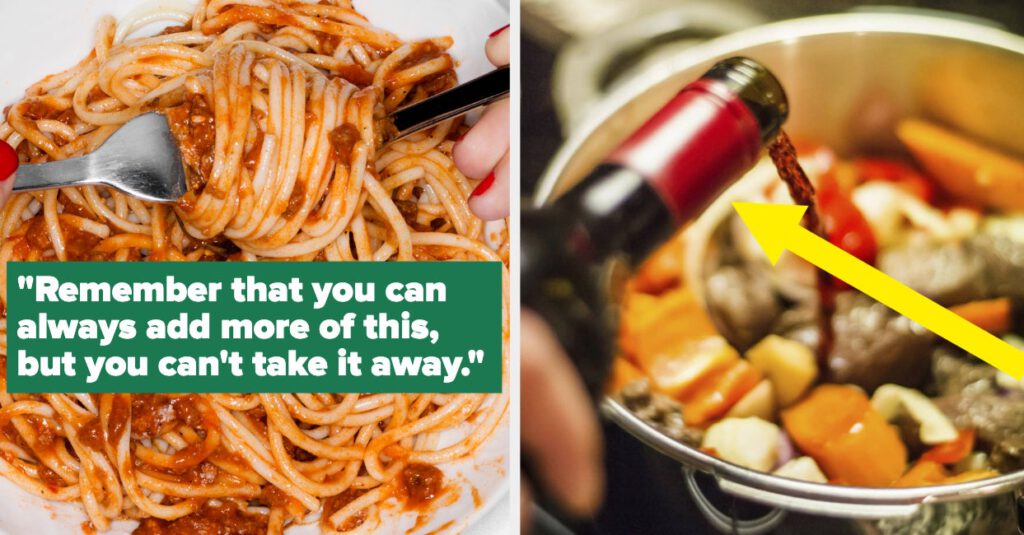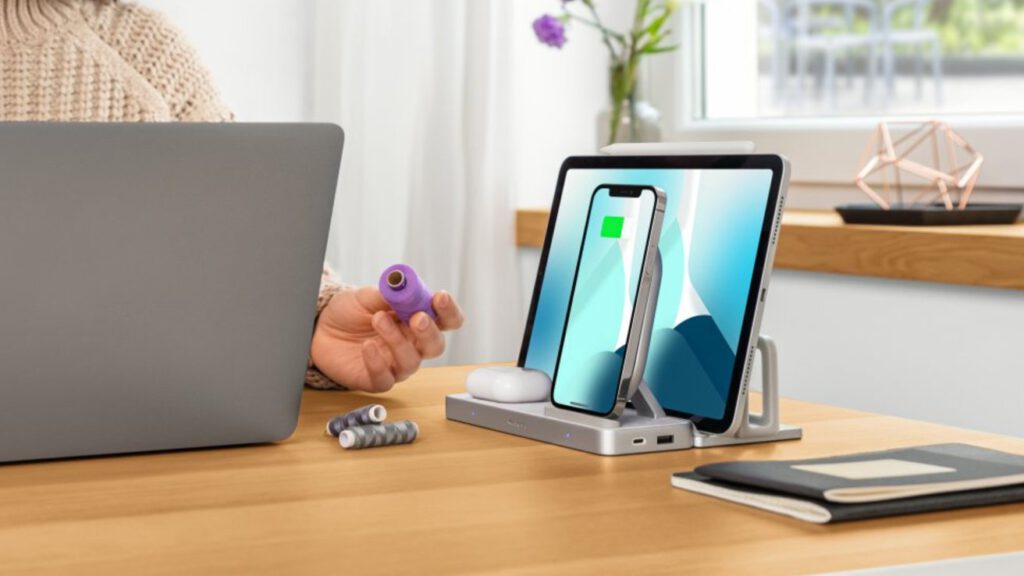“That’s the easiest way to ruin a dish, and it can be so easily avoided.”
Are you constantly noticing friends or family doing the wrong thing in the kitchen? Heck, maybe even you’ve noticed a few of your own kitchen blunders. So Redditor u/TheGreyBearded asked, “What’s a common mistake you keep seeing people make in the kitchen?” Here’s what people said.
1.
“Using little or no salt when a recipe says ‘season to taste’ and doesn’t specify an exact amount. I’ve too often seen people use the tiniest pinch of salt in a huge pot of stew and call it a day.”
2.
“Not properly timing your cooking. For instance, my partner doesn’t start boiling the water for pasta until he’s done with the other components of the meal. As a result, we end up having to wait another 30 minutes to eat. I really take my own efficient processes for granted until he cooks for me. You’ve got to think ahead a little in the kitchen.”
3.
“Crowding a pan — putting too much food in it at once, which drops the temperature, creates steam, and prevents a good browning. In fact, I’m often guilty of this one.”
4.
“Not letting food set or rest before serving. Fried food, for example, doesn’t taste good if it doesn’t have time to rest and become crunchy after cooking. If you’re baking cookies, they need time to set or else they fall apart. I love eating, so I understand the excitement of digging in right away, but there are things that need time to rest after cooking in order to achieve the proper texture and taste.”
5.
“Never sharpening your kitchen knives. I don’t care what brand of knives you have. Even if they’re super fancy, if you spend any serious amount of time cooking, your knives will go dull eventually and need sharpening.”
6.
“Not reading the recipe from start to finish before you begin cooking. I’ve certainly been guilty of this. I’ll start cooking when I’m hungry and ready to eat only to discover there’s a step that says ‘refrigerate for at least two hours.’ It’s the worst feeling in the world, but it can be avoided by simply reading through a recipe ahead of time.”
7.
“Cutting into a loaf of bread right away when it comes out of the oven. It’s SO tempting to slice into bread while it’s hot and crusty, but it’s actively still baking and will be for some time. If you let that steam out too early then your bread will be gummy.”
8.
“Adding fresh garlic too early when frying. In almost every recipe where you need to sauté onions and garlic, the instructions say put them in together. Wrong! That’s how you burn the garlic and destroy the dish.”
9.
“Roasting ingredients that are still damp or moist. Pat dry meats with a paper towel and thoroughly dry veggies before adding fat to roast. Otherwise you’re just basically steaming them in the oven.”
10.
“Constantly checking on your food in the oven. Heat will fly out, and you’ll have to add more cooking time because the oven will have to preheat once again. Use self control and open the oven sparingly.”
11.
“Putting utensils and kitchenware in the dishwasher that don’t belong there like chef knives, wooden cutting boards, etc… Yes, it will probably clean them, but you’ll also be replacing these items with new ones sooner rather than later.”
12.
“Cranking up the heat on the stove super high to ‘cook faster,’ but you end up burning your food while undercooking the middle so it’s still cold or raw.”
13.
“Overcooking or undercooking food simply because you don’t have a thermometer. My cooking has improved so much since I got an instant read thermometer. It simplifies everything and takes the guess work out of cooking.”
14.
“Waiting until you’ve finished cooking before you actually taste the food. I’ve had to teach so many of my friends to taste their food as they cook it. That way you know whether or not ingredients must be added to achieve the right flavor (more salt, more hot pepper, a bit of acid). It’s shocking to me that this is not obvious to some people.”
15.
“Cooking with anything labeled a ‘cooking wine.’ You shouldn’t be cooking with an expensive bottle of wine, but you should be cooking with wine that’s decent enough to drink on its own.”
16.
“Not cleaning as you cook. I can’t stand when I see it. Cleaning as I go makes my life much easier. Nothing feels worse than cooking for a while, eating, and feeling great, then remembering the mountain of pots, pans and utensils you have yet to wash.”
17.
“Thinking that you can just blindly follow a recipe without adapting. Recipes were written by one person cooking in a single kitchen, with a set of tools, specific equipment, and a different set of ingredients. These things will never 100% match what you’re working with. So be adaptive: be prepared to adjust how hot your pots and pans are, how you process your ingredients, or how long you cook them for.”
18.
“Using way too much salt to finish a dish when that dish is really looking for a splash of acid like lemon juice or vinegar.”
19.
“Not letting meat rest after cooking. Resting is part of the cooking process. That bacon you cooked to perfection that’s still in the skillet? Yeah, that’s too late. You need to remove things from heat a little earlier than you’d think so that the ambient heat continues to do its job. Otherwise it’s going to taste overcooked.”
20.
“Adding seasonings too quickly. Remember, you can’t get some stuff back after you add it. Go slow with seasonings, and lightly. You can always add more, but you can’t take it back.”
21.
“Putting fresh herbs into the dish too early in the cooking process. Fresh herbs taste better when cooked for a short time. Cooked for a while and they lose their flavor. Throwing fresh herbs in a marinara sauce and simmering it for hours is something I see my family members do way too often.”
22.
“Not cooking with the proper pans or always using non-stick skillets. If you use a non-stick pan for something like steak, the temperature required to get a nice sear will ruin the special coating on them, rendering them useless. Use a well-seasoned cast iron skillet. If you have to use a stove, it only takes a couple minutes to get a good sear with a ripping hot pan.”
23.
“Not cooking with the proper oil. Knowing the smoke points of different oils is extremely important, but so is knowing if an oil will infuse a flavor into what you’re cooking or if it’s neutral. Get a chart that lists both the smoke point and if the oil is neutral flavored.”
24.
“I always see that people underestimate the time it actually takes to preheat ovens, pans, grills, etc… My mother will ‘preheat’ the oven for five minutes, then put some broccoli or green beans in to roast for another 20 minutes, and she’ll be surprised when the vegetables come out unevenly cooked and mushy. You need to let the oven preheat so that it fully comes to temperature. Same with cast iron pans. They should sit on the stove over medium-high heat for at least ten minutes before you add food.”
25.
“Seasoning with salt after you’re done cooking, instead of throughout. You can’t expect the saltshaker at the table to do the job. Nothing seasoned at the table with a saltshaker will ever even approach the flavor of something that was seasoned throughout the cooking process.”
26.
“Not giving the oil enough time to get nice and sizzling hot before frying or pan-searing food. This will make your ingredients soggy and oily. Wait for the oil to get hot and then add your food for a good sear or delicious crunch.”
27.
“Not measuring out and preparing your ingredients before cooking. Even when I’m making a sandwich, I portion out all of the ingredients, then put the containers away before I start assembling it. Especially in small spaces, this saves so much hassle and frustration and helps make sure things are cooked the way you want them.”
What’s a cooking mistake you notice others making or are guilty of making yourself? Tell us in the comments.




